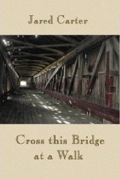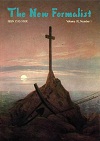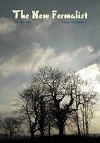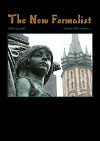Wild Geese
Watching them pass overhead,
That V-shaped fleet,
I felt blue sky
Beneath my feet.
I felt close company
With the winds that swirled
In perfect circles
Around the world.
I knew the best places
To fish and swim.
I knew the woods,
Every leaf and limb.
Then I awakened
With a sudden shock—
I found myself at the head
Of the flock.
The air my wings strummed
With fierce conviction.
I honked the sacred words
Of an ancient benediction.
My long neck stretched out
Across a field of wheat.
I knew the way, and felt
Blue sky beneath my feet.
We soared southward,
And the world far below
Stopped everything to gaze up
At our traveling show.
Moon
Tonight the lamp-lit houses
are like words in a sentence
spoken in anger.
Moon, old skin
of inscrutable uncertainties,
mysteries, doubts,
shine down, move
in and out of the children,
tickle the roofs and the chimneys,
smooth back the field,
and when whisked up by a wind
gently blow thoughts
like a horn. Let your bones
catch in the trees,
wail when the stars shine bright,
and pose no hard questions
to a soul tonight.
The Poet Make the Morning Light Break
Through this old door
I have passed before.
Dark make new lore,
then morning comes the downpour—
Words decide my fate.
The old poet cannot wake,
though the poet make
the morning light break.
Come pale light, glorious light
come old poet to your fate,
make the morning light break.
Philip Larkin
Who am I to say demagoguery
has hurt my reputation?
No more of less derogatory
than my current situation.
The newspapers said I died in bed.
A reviewer said I fell and hit my head
at Westminster Abbey.
The thing that keeps me at it.
That is not my habit,
gnaws at my brain,
drives me insane
is the shame
that accompanies
my illustrious fame.
Join the debate.
Procreate.
Consume the meal.
Listen to the mouse squeal.
Turn fiction into fact,
as stone into bread,
as water into wine.
Give my skull a crack.
Who wants to lose your hair
or turn a circle into a square?
Is it not fair? Are we not laid bare
in the grave. Now the snails
love me for who I am.
They nibble at my coattails,
and the critics poke at my bones,
the good ones crawl into my grave.
I have slept in many jails.
I once dated a Welsh acrobat.
How indiscreet. Ask biographical details.
Trim the fat. Pet the cat.
Have the decency to remove your hat.
I have eaten rat tails.
The best, indeed the only source
of truth is the hank of hair
curled round my skull.
I am Britain's golden boy,
their naughty nightmare.
Sorrow was my greatest joy.
I visited graveyards
since I was a small boy.
A rather unpleasant
very small and diminishing
boy I remained.
My great innovation
was an intellect.
A genius I was entrusted
with the task -
largely, I suspect,
of composing the queer, mean thoughts
of my own shy generation.
I heard the clock by the dresser cry out.
Write of small things. Be very quiet, tame.
Eat your fill of shame.
Play the wicked Poet's game.
Always whisper, never shout.
Fill all believers up
with dread and doubt,
and everyone
will remember your name.
Produce a slight feeling
numb in the head,
of monotony and repetitiousness,
of misogyny, speak ill of my wife
who took her life.
I shall cover the spread,
make friends with the dead,
until almost the end of my life -
led by strange, cosmic melancholy
from which flashed of more melancholy,
angst scented with sour bread,
and shall then and only then
strike my head again and again
upon the stone hard surface
of my fame.
I came to life
at my writing desk—
the sordid monster
with a gift to molest.
I was the fat goose my mother fed.
What was the first book
of poetry I read ?
It provoked me to wet the bed,
In the first girlie magazine I read
I saw God's face turn red.
I became an evil teddy bear.
To every reader I gave a scare,
I spat upon the walk
of the Royal Garden,
I was jeered.
I was bizarre. I was feared.
In the newspaper,
it was alleged
I sat down in an electric chair,
my hair stood
straight up in the air.
People scattered everywhere.
I was the wicked poet
who cast his spell
on England and rang my poems
like a giant bell in Trafalgar Square,
so beastly and sublime
I kissed the gates of Hell
with each poem I wrote.
In the grave, I am middle-aged,
yet not quite reached my prime,
I write better poetry in my sleep
than most of generation.
But then who am I to judge.
I am the genius that bears the grudge
against humanity.
I deplore their condemnation
of my insanity.
Take from me my vanity.
My critics scold me with their profanity.
I am the one who they hate.
Let us debate. Who am I? Am I great?
My bones lie on your plate.
A piece of paper is my soul.
I am as talented as a toilet bowl.
I am asked
carefully crafted questions
even in my grave.
I don't know the answers.
I murmur: "I need a shave."
I am stalked like a wild deer.
It is the poem that I fear
most. It will kill me
if I don't write it.
I rise from the grave to defend my life.
My pen is a dull knife.
I drink liquor to think more clearly.
I stink of bad poetry
written in a dull age.
I smell a rat.
I am bloated. My head is fat.
On all humanity, I frown.
I wear an old hat,
let all dip into the page
and drown.
I am not overcome with shyness.
Even in death I'm an exhibitionist.
I am celebrated on seven continents.
I am large.
About seven miles tall,
I loathed my country. Let it fall.
I loathed women with large breasts
and long, flowing hair.
I love their lips
when they recite my poetry.
Only half in jest,
My posthumous work
runs solid, uncomplicated, first-rate
I write a poem every week.
Excellent for a deceased poet.
Don't call me late.
I love reading my obituaries.
I sit on my back in my casket.
I devour them like raspberries
picked by a naughty child
and dropped into a basket.
I wore flashy clothes.
I wore a red ball on my nose.
Now gone are my toes.
If I return, I promise
to write only prose.
I have ambition,
even in the grave.
Hang my poems in the Louvre.
I would write more,
I would write better
if I could move.
On all humanity, I frown.
let all dip into the page
and drown.
Elegy For The Old General
The minutes had come round,
They had drilled like platoons,
Marching up and down
The parade ground,
And scarce few had paused to weep
He had died peacefully in his sleep.
The holy terror didn't shock him anymore,
And since retirement,
He'd lived off the fat of his contradictions,
And kept in the bank a safe deposit of blood and gore
(The last vestiges of his crumbled down convictions).
The minutes of his military life marched past in single file
And at his orders, they rallied to his side,
Filling him with dread,
Fought bravely against the powerful doubts
That came suddenly in his head.
He relished the four o'clock mock-executions,
The miraculous births and deaths of striking elocutions
Which sprang forth from the distraught down trodden poor
None of whom were worth fighting for.
He choose to ignore the educational institutions,
Where raving mad radicals concocted
Their strange behavior and clever revolutions.
He found exciting the folly and the fighting
Of small minds at war.
He loved the wild look
That came over his face at six o'clock,
When he read from his biography.
He would sit in his rocking chair and rock,
Smoking a cigar, and when dark had begun to fall
Outside, he would gaze over his shoulder at the clock,
And it was the only time he smiled,
When he cried so loud the neighbors could hear
'There's no hope for Oscar Wilde.'
He hated civilian life. It was cruel, harsh punishment.
He felt exiled. He peeled an orange with his knife,
Drank too much, beat his wife.
At odd moments, interviewed by the press,
He commended the Romans for their brutality,
Loathed the Chinese plurality.
He preferred his shame stirred, not mixed,
And worried about his complexion,
Which appeared upon inspection
Pale, drab. His eyebrows, bushy, somewhat untidy.
He was opposed to nuclear disarmament.
Peace was not so high and mighty,
He believed the Japanese were sons of bitches
Who burned their sirloin steaks like witches.
And at his funeral, the rifles fired off,
The military minutes marched round
And at his graveside gave pause,
The trumpets shrill sad cry boasted
Of his many victories, without mention
Of his many flaws.
The Battered Wife
The first time
you crushed my skull
I was happy,
but that was a thousand years ago.
I have been tossed from windows
and set aflame as I slept in bed;
I have been shot in the head,
gagged and dropped from a train.
I have been poisoned
and left in the dark beside a road.
I have given birth to a thousand children,
and each one I loved.
You were tall in France,
and short in Spain,
and often handsome
and occasionally bald and fat—
with blue eyes in Austria
and brown eyes in Italy.
You drank vodka from a hat
and played the violin.
You were Jack in England,
Juan in Peru,
and Tom in Hungary.
(What was that tune
you were always whistling?)
During the Ch'in dynasty
you bloodied my face
and broke my arm.
You cursed at me
everyday for centuries.
I have wept in many centuries.
You have scorned me too long.
Never have I hidden from you.
Always I met you at the station,
greeted you with a kiss.
You placed flowers on my grave—
not once have you wept.
I lay still in my favorite dress.
You cursed at me
everyday for centuries.
I have died in many centuries.
I shall come again
and wait for you at the station
and greet you with a kiss.



